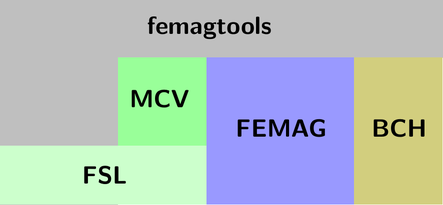Welcome to FEMAG Tools’s documentation!¶
Femagtools is an Open-Source Python-API for FEMAG offering following features:
run Femag with a FSL file anywhere: locally (single and multi-core), remote (ZMQ), HT Condor, Cloud (Amazon AWS, Google Cloud)
read BCH/BATCH, I7/ISA7, NC, PLT, ERG files
read and write MCV files (magnetizing curves)
create FSL files from model and calculation templates and/or user specific FSL or from DXF
create and analyse symmetrical windings
create a machine and winding layout from basic requirements
identify the model parameters of equivalent circuit
calculate machine characteristics and efficiency maps by using analytic machine models
create a variety of plots
execute parameter studies and multi-objective optimization
A couple of jupyter notebooks and example scripts can be found in the source directory hosted on github: <https://github.com/SEMAFORInformatik/femagtools/>`.
Contributions and feedback are highly welcome.
Installation¶
Femagtools can be installed on any 3.x Python distribution with Numpy, Scipy and Pip:
$ pip install femagtools
Note:
The package has a couple of optional dependencies:
* dxfsl = ['dxfgrabber', 'networkx']
* mplot = ['matplotlib']
* meshio = ['meshio']
* vtk = ['vtk']
* zmq = ['pyzmq']
If you want them all:
$ pip install femagtools[all]
or individually by appending the name of the dependency in brackets. Example:
$ pip install femagtools[dxfsl]
Prerequisite: a fairly recent FEMAG version (see <https://www.gtisoft.com/download/femag-download>) must be found in one of the directories listed in your PATH variable.
If a proxy is needed:
$ pip --proxy http://proxy.hell:3128 install femagtools
For further information: <https://pip.pypa.io>.
Console Scripts¶
The following scripts can be executed from console:
femagtools-plot: create plots from BCH/BATCH file
femagtools-convert: various mesh format conversion
femagtools-bchxml: convert BCH/BATCH file into XML
femagtools-dxfsl: convert DXF into FSL
User Guide¶
Indices and tables¶
Copyright¶
Copyright:
2017-2023 Semafor Informatik & Energie AG, Basel
2024 Gamma Technology LLC, Westmont, Illinois
License: BSD, see LICENSE for more details.

